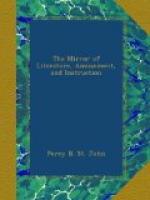(To be concluded in our next.)
[1] “Ill-omen’d in his form, the unlucky
fowl,
Abhorr’d by men,
and call’d a screeching owl.”—Garth’s
Trans.
[2] “They fly by night, and assail infants in the nurse’s absence.”
[3] “Even the ill-boding owl is declared a bird of good omen.”
[4] “The Stygian owl gives sad omens in a thousand places.”
[5] “A feather of the night owl.”
[6] ——“And, on her palace
top,
The lonely owl with oft repeated
scream
Complains, and spins into
a dismal length
Her baleful shrieks.”—Trapp’s
Trans.
[7] “And sell bodies torn from their tombs.”
* * * * *
SPIRIT OF THE PUBLIC JOURNALS.
BLONDEL DE NESLE.
“Blondel de Nesle the favourite minstrel of Richard Coeur de Lion, and an attendant upon his person, devoted himself to discover the place of his confinement during the crusade against Saladin, emperor of the Saracens. He wandered in vain from castle to palace, till he learned that a strong and almost inaccessible fortress upon the Danube was watched with peculiar strictness, as containing some state-prisoner of distinction. The minstrel took his harp, and approaching as near the castle as he durst, came so nigh the walls as to hear the melancholy captive soothing his imprisonment with music. Blondel touched his harp; the prisoner heard and was silent: upon this the minstrel played the first part of a tune, or lay, known to the captive; who instantly played the second part; and thus, the faithful servant obtained the certainty that the inmate of the castle was no other than his royal master.”—Tales of a Grandfather, p 69.




